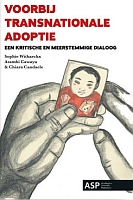Voorbij transnationale adoptie

Contributor(s)
Cawayu, Atamhi (editor)
Withaeckx, Sophie (editor)
Candaele, Chiara (editor)
Language
DutchAbstract
Transnational adoption was long considered an inherently altruistic and humanitarian practice, allowing mainly children from the Global South and Eastern Europe to find new homes with adoptive parents in the West (Briggs, 2012; De Graeve, 2013; Hübinette, 2007; Volkman, 2003; Wekker et al, 2006). In recent years, however, increasingly critical questions and concerns have been raised both in practice and research regarding these relocations of children. Transnational adoption occurs within a context of sharp inequality between the countries of origin and destination. The high demand for adoptable children in the West, combined with the vulnerability of the first parents and communities from which these children are adopted, fosters malpractices such as fraud, kidnapping, and deception (Smolin, 2006; Loibl, 2020; Cheney, 2021). Although it is often pointed out that adoptees "do well" despite everything, the lack of information about their own background and identity can heavily weigh on the mental well-being of adoptees. The ongoing testimonies about malpractices have meanwhile led to parliamentary discussions and the establishment of government commissions in various European countries, including Belgium and the Netherlands, to investigate adoption practices past and present. These investigations have resulted in the official recognition of victims of malpractice and the issuance of apologies, the establishment of a better framework for aftercare, and the (temporary) suspension of adoption. The question remains: Is adoption still desirable, and if not, how can we best care for children in emergency situations? This book combines recent insights from Dutch and Belgian scholars with reflections from adoptees themselves. The academic contributions situate adoption within a global context marked by inequalities based on gender, socio-economic status, 'race', ethnicity, and the North-South divide, addressing the thorny questions and dilemmas that adoption raises. In the essays and reflections written by adoptees, we learn about how they experience adoption in all its complexity, the impact of adoption and malpractices on their daily lives, and how they take initiatives to (re)shape their identities.
Keywords
transnational adoption; transnational reproductionDOI
10.46944/9789461175618ISBN
9789461175311, 9789461175618, 9789461175601Publisher website
https://www.aspeditions.be/en-gb/home.htmPublication date and place
Brussels, 2023Imprint
ASP EditionsClassification
Adoption and fostering
Pages
368Chapters in this book
- Hoofdstuk 8 - Van draagmoeders tot metis mama’s. Naar een dekoloniale feministische analyse van transnationale reproductie in België
- Hoofdstuk 10 - Kan de geadopteerde vertalen? Een pedagogische beschouwing van erfgoedtaal(on)geletterdheid in transnationale adoptie
- Hoofdstuk 6 - Interlandelijke adoptie naar Nederland: de voortzetting van een gemankeerd beleid
- Hoofdstuk 7 - Geadopteerden aan het woord: de psychosociale impact van wanpraktijken in transnationale adoptie
- Hoofdstuk 12 - Mimic Diaspora: identiteit en het idee van de ‘Ander’ bij Zuid-Koreaanse adoptiemigranten in Vlaanderen (1968-2021)
- Hoofdstuk 14 - Spoorloos: ‘emotietelevisie’ tussen sensatie en adoptiekritiek
- Hoofdstuk 3 - ‘Al red je er maar één’. Interlandelijke adoptie in Nederland (1880-2022)
- Hoofdstuk 18 - Afstand en adoptie: het perspectief van moeders in India
- Hoofdstuk 25 - Herstel- en rechtvaardigheidsinitiatieven in beweging? Een toepassing op transnationale adoptiepraktijken van China naar België en Nederland
